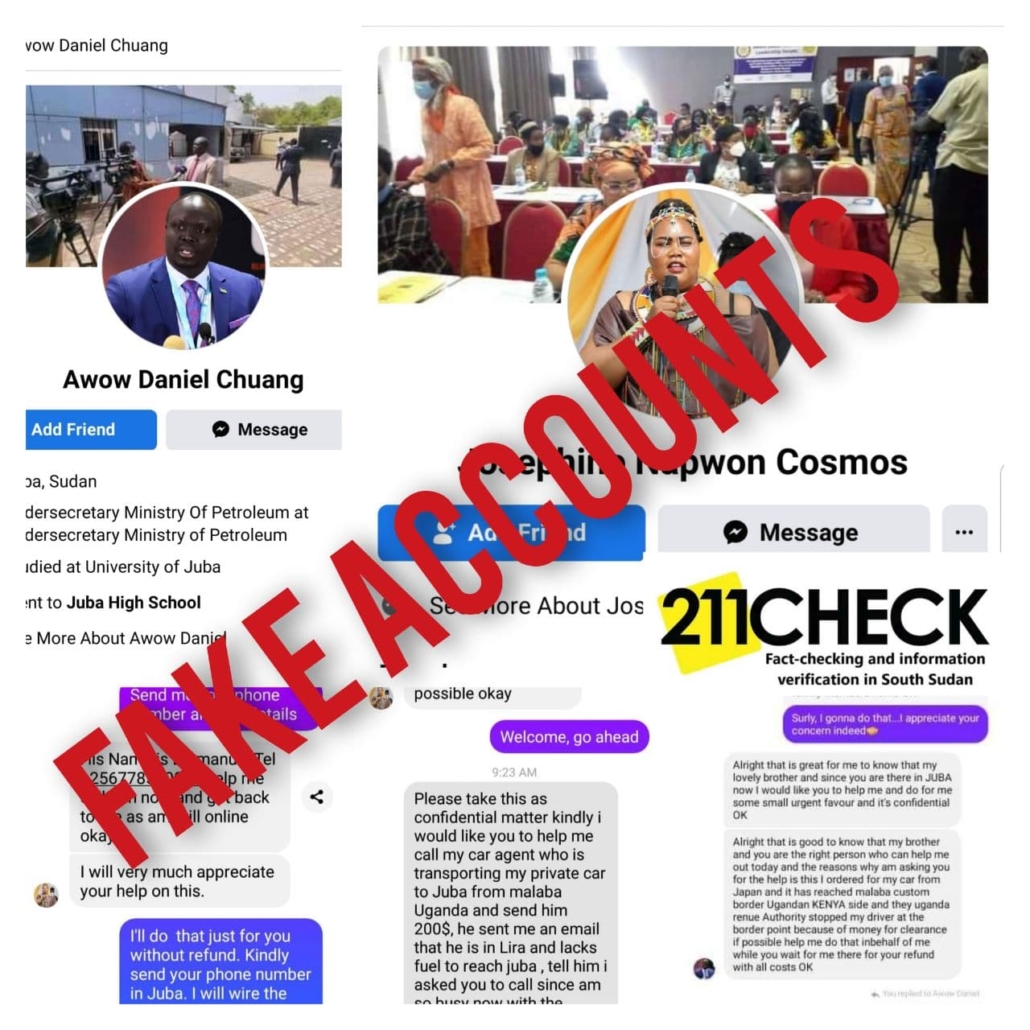Scam Alert: Fake Facebook Accounts
The Facebook accounts Awow Daniel Chaung and Josephine Napwon Cosmos asking random Messenger users to wire them money are imposters.
By 211 Check Desk
211 received reports about two Facebook accounts. The names Awow Daniel Chaung, Undersecretary at the Ministry of Petroleum, and Josephine Napwon Cosmos, Minister for Environment and Forestry, are both forgeries. They are pretending to be these government officials.
According to reports received by 211 Check, these accounts are randomly requesting monetary assistance from Facebook users via messenger, as shown in the screenshots below.
In one of the incidents, the fake accounts claim to have ordered a car from Japan, arrived at the Malaba border, and needed assistance so that a victim would send money for border clearance.
Surprisingly, if you repeatedly question them or become suspicious of them, they will block you and move on to the next unsuspecting prey.
The impostor usually gives unsuspecting people an MTN Uganda number so that money can be transferred through the line.
Josephine Napwon’s legitimate Facebook page is: Hon. Josephine Napwon – National Minister of Environment and Forestry RSS.
Awow Daniel Chaung does not run a personal page at the moment.
Spot and Avoid Government Impersonator Scams
- A government impersonator scam often starts with a call, email, or text message from someone who says they’re with a government agency or official. They might give you their “some reason” to sound official. And they might have information about you, like your name or home address.
- They’ll also give you some reason why you need to send money or give them your personal information immediately. If you get a message like that, ignore the message. It’s a scammer.
- Because government agencies or officials won’t call, email, or text you and ask for money or personal information. Only a scammer will do that.
How to avoid the scam
- Don’t wire money, send cash, or use any kind of transaction to pay someone who says they’re a government official or agency. Scammers ask you to pay these ways because it’s hard to track that money, and almost impossible to get it back. They’ll take your money and disappear.
- Don’t give your financial or other personal information to someone who calls, texts, or emails and says they’re a government official or agency. If you think a call or message could be real, stop. Hang up the phone and call the government agency directly at a number you know is correct.
- Don’t click on links in unexpected emails or text messages. Scammers send emails and text messages that look like they’re real, but are designed to steal your money and your personal information. Don’t click on any link, and don’t pass it on to others. Simply delete the message.
#FactsMatter, Don’t be a victim of fake news; instead, let’s fight misinformation on both mainstream and alternative media. To avoid spreading false information, don’t share content you’re not sure about or don’t know where it came from.
To learn more about our fact-checking process, go to https://211check.org/how-to-fact-check/ or send us a WhatsApp message at +211 917 298 255 to present a claim, and our team will immediately fact-check it and respond.
This fact-check has been produced as part of our incubation program under Code for Africa.


